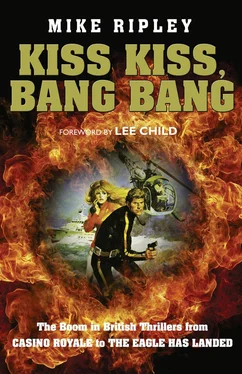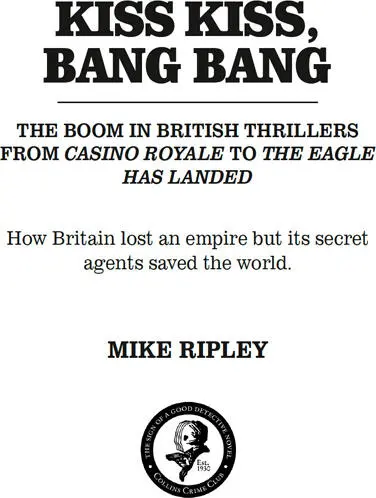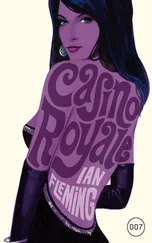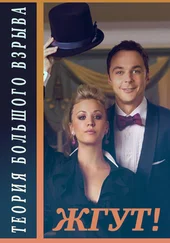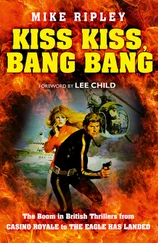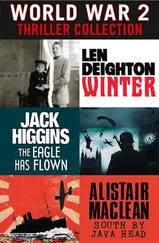
Published by COLLINS CRIME CLUB
An imprint of HarperCollins Publishers Ltd
1 London Bridge Street
London SE1 9GF
www.harpercollins.co.uk
First published in Great Britain by HarperCollins Publishers Ltd 2017
Copyright © Mike Ripley 2017
Foreword © Lee Child 2017
Cover layout design © HarperCollins Publishers Ltd 2017
Cover illustration: detail from When Eight Bells Toll by Alistair MacLean © HarperCollins Publishers 1981 (front); Robert Kyle’s Kill Now, Pay Later by Robert McGinnis © Dell Publishing/Penguin Random House 1960 (back).
Author photograph © Mike Ripley
Mike Ripley asserts the moral right to be identified as the author of this work.
Every effort has been made to trace copyright holders and to obtain their permission for the use of copyright material. The publisher apologizes for any errors or omissions on the above list and would be grateful if notified of any corrections that should be incorporated in future reprints or editions of this book.
A catalogue copy of this book is available from the British Library.
All rights reserved under International and Pan-American Copyright Conventions. By payment of the required fees, you have been granted the non-exclusive, non-transferable right to access and read the text of this e-book on screen. No part of this text may be reproduced, transmitted, down-loaded, decompiled, reverse engineered, or stored in or introduced into any information storage and retrieval system, in any form or by any means, whether electronic or mechanical, now known or hereinafter invented, without the express written permission of HarperCollins.
Source ISBN: 9780008172237
Ebook Edition © May 2017 ISBN: 9780008172244
Version: 2017-11-20
For Len Deighton,
who has a lot to answer for.
There will be spoilers. Live with it. Many of the thrillers referred to here were published fifty years ago. You’ve had time.
‘A book, film, or play depicting crime, mystery, or espionage in an atmosphere of excitement and suspense.’
Collins English Dictionary
‘What exactly is a thriller? The term seems to cover a multitude of sins and quite a fair proportion of virtues.’
Margery Allingham, 1931
‘You after all write “novels of suspense” – if not sociological studies – whereas my books are straight pillow fantasies of the bang-bang, kiss-kiss variety.’
Ian Fleming in a letter to Raymond Chandler, 1956
Contents
Cover
Title Page
Copyright
Dedication
Spoiler Alert
Thrillers
Foreword
Preface
Chapter 1: A Question of Emphasis
Chapter 2: The Land Before Bond
Chapter 3: Do Mention the War
Chapter 4: Tinkers, Tailors, Soldiers, Spies. But Mostly Journalists.
Chapter 5: End of Empire
Chapter 6: Travel Broadening the Mind
Chapter 7: Class of ’62
Chapter 8: The Spies Have It, 1963–70
Chapter 9: The Adventurers, 1963–70
Chapter 10: The Storm Jackal Has Landed – The 1970s
Chapter 11: The New Intake
Chapter 12: Endgame
Appendix I: The Leading Players
Appendix II: The Supporting Cast
Notes & References
Acknowledgements & Bibliography
Index
Also by Mike Ripley
About the Publisher
Some time ago Mike Ripley e-mailed and asked if I would write a foreword for his new book. I knew roughly what it was about: Mike and I bump into each other a couple of times a year, at industry junkets, and like writers everywhere we always ask about works in progress – secretly hoping, I suppose, that the other guy is having it even worse than we are. So I knew the project was a survey of British thriller fiction during the two golden decades between the mid-Fifties and the mid-Seventies. Knowing Mike, I knew the scholarship would be meticulous; I knew the writing would be pleasantly breezy, but always willing to seize passionately upon a point, and render a clear and acute conclusion, without fear or favour. It would be a book I would want to read – maybe even pay for – so why not get it early and free? So I said yes.
Mike is a slightly older codger even than I, so there was no immediate e-mail response to my response. I got the impression he treats e-mail like the country squire he pretends to be, treats the post, perhaps once a day, perhaps in the early morning, at the breakfast table. I spent the rest of my own day writing a newspaper article commissioned by the New York Times . I was never quite sure what they wanted, but it seemed to require a retrospective mood, even elegiac, starting right back at the beginning, which in my case meant growing up in provincial post-war Britain. I polished the piece and sent it off.
Then – bing – the attachment arrived from Ripley.
For the New York Times , I had started, ‘Objectively I was one of the luckiest humans ever born.’
Ripley’s preface started, ‘I am of the luckiest generation.’
He’s a couple of years older than me, which makes us a typical older brother–younger brother age pairing right in the middle of the luckiest demographic in history. For the Times I said we were a stable postwar liberal democracy, at peace, with a cradle-to-grave welfare system that worked efficiently, with all dread diseases conquered, with full employment for our parents, with free and excellent education from the age of five for just as long as we merited it. We had no bombs falling on our houses, and no knocks on our doors in the middle of the night. No previous generation ever had all of that, not in all of history, and standards have eroded since. We were very lucky.
But, I said, it was very boring. Britain was grey, exhausted, physically ruined, and financially crippled. The factories were humming, but everything went for export. We needed foreign currency to pay down monstrous war debt. Domestic life was pinched and austere.
We escaped any way we could. Reading was the main way. Thrillers were the highest high, and British writers were never better than during our formative years. But finding out about them was entirely random. Obviously there was no Internet – electricity itself was fairly recent in some of our houses – and it was rare to meet a fellow aficionado face to face, and enthusiast bookshops were inaccessible to most of us, and so on. We blundered from one random find to another. Some of us had older brothers blazing the way, and really that’s exactly what this book is – the perfect older brother, equipped with 20/20 hindsight, saying, ‘Read this, and then this, and this, and this.’
I can follow my own snail-trail across the landscape that Ripley so comprehensively describes. I can pick my way from A to Z, book to book, zigging and zagging. I can remember the joy of escaping, and the thrill of immersion in a fast and gaudy world, and wanting to do it again and again. In that sense this book feels like my own personal memoir, and inevitably it will to thousands of others too, with their own unique zigzag snail-trails, and as such it seems of great sentimental value, like a long-lost diary, like a list of the way stations that carried us through a time that promised to be forever grey.
Читать дальше
